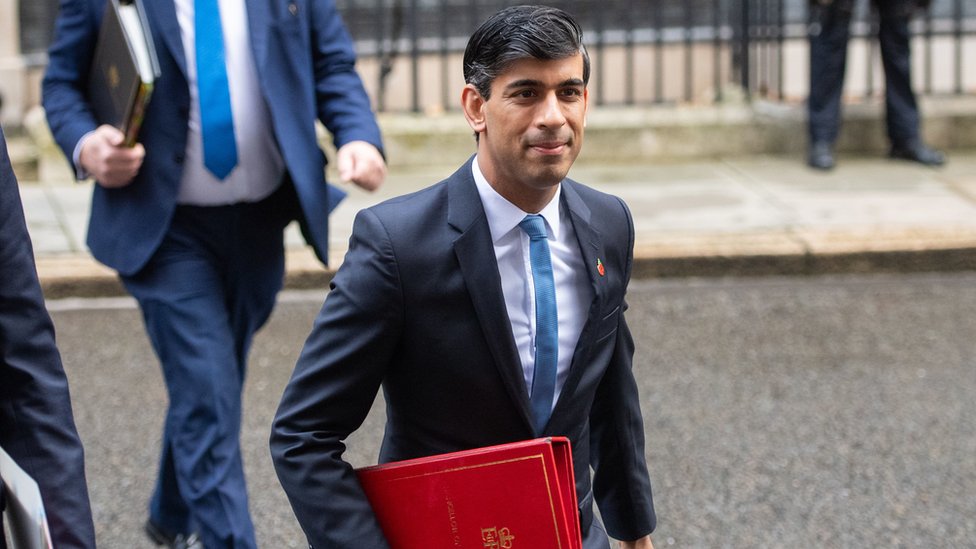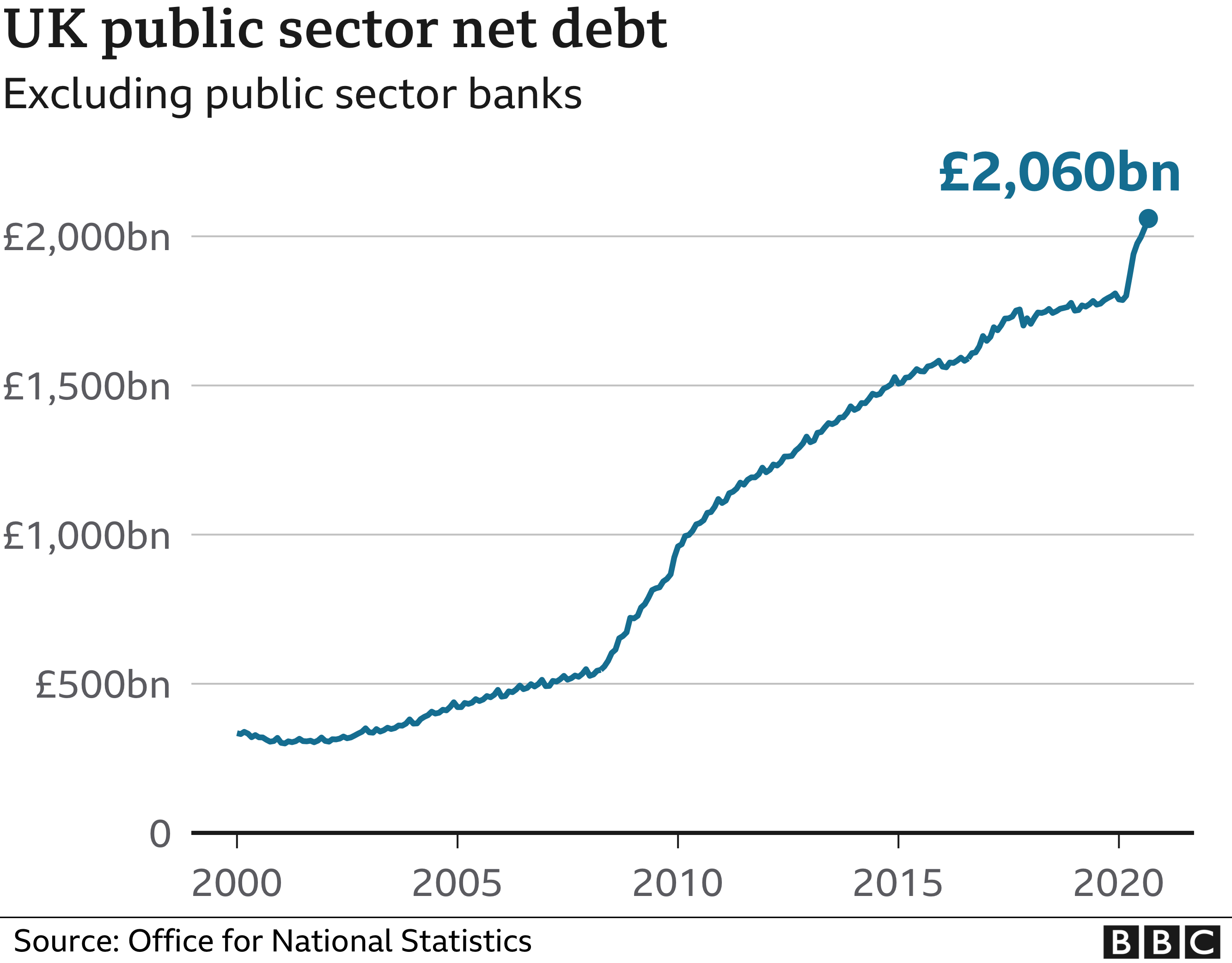
Chancellor Rishi Sunak is to announce an extra £3bn for the NHS - but has warned that people will soon see an "economic shock laid bare" as the country deals with the Covid pandemic.
The one-year funding will be pledged in the Spending Review on Wednesday.
However, Mr Sunak said Covid's impact on the economy must be paid for - and high levels of borrowing could not go on indefinitely.
Borrowing in October hit £22.3bn, with public sector debt over £2 trillion.
The Treasury said the £3bn package for the NHS would help tackle backlogs in the health service, with thousands of treatments and operations delayed because of the pandemic.
The number of people waiting a year for treatment has risen from about 1,500 in February to 140,000 in September, the Treasury noted.
While the extra funding only applies to England, the devolved administrations in Scotland, Wales and Northern Ireland will receive equivalent funding via the Barnett formula.

Where will the £3bn go?
- £500m will support mental health services in England
- £1bn will go towards reducing NHS backlogs, with up to one million extra checks, scans and operations paid for
- £1.5bn will be used to ease existing pressures in the health service

However, the chancellor warned of hard times ahead.
Speaking to the Sunday Times, Mr Sunak said: "People will see the scale of the economic shock laid bare. We can see the data every month, and obviously the shock that our economy is facing at the moment is significant."
He indicated that taxes may have to start rising next year, and there could be spending cuts. But it is a "question of timing" while the economy is in difficulty, he said.
"Once we get through [the crisis] we'll have to figure out what the best way of returning to sustainable public finances is.
"I'm hopeful that by the spring, with positive news on both mass testing and vaccines, we can start to look forward."


Bailouts for the NHS during winter are not unusual, but this is, unsurprisingly, a large one by recent standards.
The funding boost represents between 2 to 3% of the frontline budget. Making sure it has an immediate impact will, however, be tricky.
Charities will play a crucial role in helping relieve the growing burden on mental health services from the pandemic. But the need for social distancing and infection control has reduced the amount of activity NHS hospitals can do and the health service is already purchasing a significant amount of services from the private sector.
There is a particular bottleneck in waits for tests and scans. There is also a finite amount of the most precious resource - staff.
The use of overtime and agency staff can help but, like the rest of the nation, significant numbers are also being asked to isolate because of exposure to the virus.
It means the NHS is ruthlessly having to prioritise - and that means Covid, cancer, emergency work and children.
Non-urgent treatments like knee and hip operations are the ones that are being hit the most. This money helps, but it certainly does not solve the problem.

The Office for National Statistics said government borrowing last month reached the highest October figure since monthly records began in 1993 - underlining the "substantial effect" the pandemic is having on public finances.
Since the beginning of April, government borrowing has reached £214.9bn - £169.1bn more than a year ago.
The Office for Budget Responsibility has estimated it could reach £372.2bn by the end of the financial year in March.

Wednesday's Spending Review is highly-anticipated, but Mr Sunak is facing criticism following reports that millions of public sector workers could face a pay freeze.
Frontline NHS staff would likely be excluded, but those affected could include police, teachers, armed forces and civil servants.
Meanwhile, the government has said that it plans to remove a longstanding bias that has affected funding for northern England and other regions outside the South East and London.
Speaking to Sky News' Sophy Ridge Programme, Mr Sunak denied the Spending Review would herald the return of austerity.
"You will not see austerity next week. What you will see is an increase in the government's spending on day-to-day public services, quite a significant one, coming on the increase we had last year."
He declined to comment on his plans for public sector pay, but said fairness was his priority "in the context of the wider economic climate" .
But Lucy Powell, Labour's shadow business secretary, told the same programme that any freeze on public sector pay would stunt the recovery.
"Economically it would be wrong to cut back the public finances at this time.
"But also morally it would absolutely be a kick in the teeth for all those frontline workers who helped support us through this pandemic, from the bin collectors to those working in public health, in the mortuaries, the fire fighters and so on."

What is the Spending Review?
A Spending Review is a chance to take a long-term view of the government's spending plans.
It sets out how much money will be allocated to different government departments and how taxpayers' money will be spent.
This year the government decided to abandon its long-term Comprehensive Spending Review amid the economic uncertainty of the Covid-19 pandemic and instead next week's review will cover just one financial year.
It is expected to focus on supporting jobs and public services through the Covid crisis as well as investing in infrastructure to deliver on the government's pledge to "level up" the country.


- A NEW SERIES OF 'GROUNDED' IS COMING: Covid-19 hasn’t gone away and, due to travel restrictions, neither has Louis Theroux...
- RADIO 1'S WORKOUT PLAYLIST: An hour of up-beat, fast-paced tunes to soundtrack your weekend workout

https://news.google.com/__i/rss/rd/articles/CBMiJmh0dHBzOi8vd3d3LmJiYy5jby51ay9uZXdzL3VrLTU1MDMyNzgy0gEqaHR0cHM6Ly93d3cuYmJjLmNvLnVrL25ld3MvYW1wL3VrLTU1MDMyNzgy?oc=5
2020-11-22 09:16:00Z
52781198430452
Tidak ada komentar:
Posting Komentar